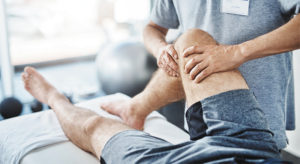 After surgery or a traumatic, degenerative or over-use injury to a bone, muscle, joint, ligament or tendon, you need to recover flexibility, mobility, and strength.
After surgery or a traumatic, degenerative or over-use injury to a bone, muscle, joint, ligament or tendon, you need to recover flexibility, mobility, and strength.
Absent a medical emergency and depending upon the nature of the problem, your orthopedic physician or surgeon may recommend a course of physical therapy to help you recover more quickly and improve function.
Physical therapy as a profession is responsible for restoring function and improving your quality of life in the home and community. Physical therapists and physical therapist assistants who specialize in orthopedic medicine, such as those who work with the orthopedic surgeons at Advanced Orthopedics Institute (AOI), are especially well-suited to guide you through the recovery process.
Moving Forward
While there are many different techniques, one of the most important steps in the healing process is to get you moving again as soon as possible.
“When patients experience an orthopedic injury, key elements of their musculoskeletal system are disrupted, which can result in pain and ultimately limit their ability to perform even basic daily tasks,” said Dr. Alfred Cook, Jr., Orthopedic Surgeon at AOI.
“Much of the physical therapy we prescribe is targeted at “re-balancing” your musculoskeletal system to help you better perform functions that matter to you.”
“We always look at the most conservative treatment available to help our patients,” said Dr. John Williams, Jr., an AOI Orthopedic Surgeon. “That may include medications, injections, splinting and physical or occupational therapy. Only then do we consider other options such as surgery.”
Taking that First Step
Your physical therapist will perform a comprehensive evaluation and get the most detailed information available on the underlying cause of your
presenting complaint. It’s also important to hear, in your words how your problem impacts your daily life.
Your physical therapist will then develop a treatment plan based on these findings, which will be modified as you respond to treatment. This usually consists of specific exercises, hands-on manual treatments, and the control of inflammation and pain.
Physical therapy is discontinued once a) your goals have been met; b) you have reached a plateau or the maximum medical improvement; or c) your condition does not improve. Typically, you will go back to see your Orthopedic physicians or surgeon after finishing a course of treatment, so further care plans may be developed if necessary.
“For patients who undergo orthopedic surgery, it’s highly likely physical therapy will be a part of your post-operative recovery,” said Dr. Williams. “Physical
therapy also has its place before a major orthopedic surgery such as hip and knee replacements.”
“Once we’ve “fixed” your issue surgically, your physical therapist will help ensure you are progressing as expected while protecting the healing process,” said Dr. Cook.
AOI’s Physical Therapy Centers
Our goal is to offer immediate access to our therapy centers and initiate treatment within 24-48 hours of your physician’s referral. This permits seamless care and allows us to monitor the quality of your care.
To learn about our orthopedic or physical therapy services, call 352-751-2862.
ADVANCED ORTHOPEDICS INSTITUTE
(352) 751-2862
1400 N US HIGHWAY 441
SHARON MORSE MEDICAL OFFICE BUILDING, SUITE 552
THE VILLAGES, FL 32159-8975
Check Also
Recurrent UTIs: Addressing the Risk of Antibiotic Resistance
Urinary tract infections (UTIs) are common bacterial infections that affect millions of individuals worldwide each …
 Central Florida Health and Wellness Magazine Health and Wellness Articles of the Villages
Central Florida Health and Wellness Magazine Health and Wellness Articles of the Villages



